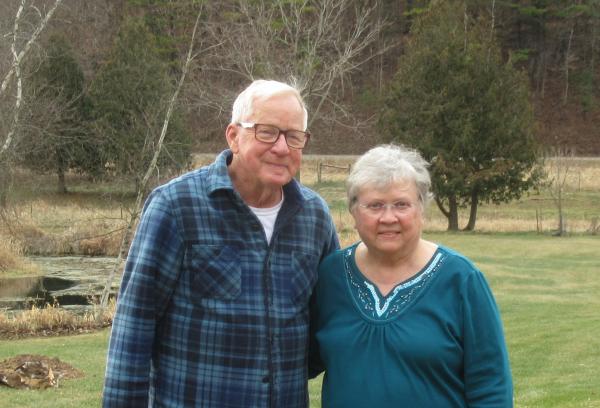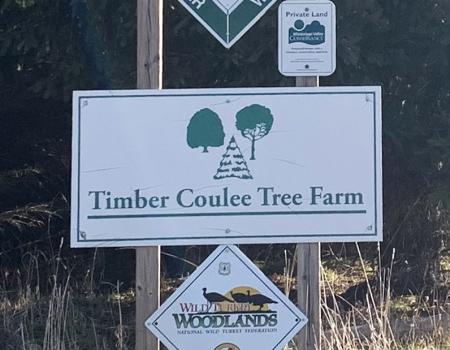VERNON COUNTY, WI — At a time when so many have had to withdraw from their usual activities to stay safe during the pandemic, Tom and Sharon Sharratt have dialed up their land conservation activities, even employing local high school students to help restore the 40-acre parcel of land they have recently conserved with the help of their local land trust, Mississippi Valley Conservancy. By salvaging and selling the black locust trees that had overgrown much of the land, they were even able to offset a significant portion of the restoration costs.
The Sharratts weren’t looking to buy more land. They had already permanently conserved 231 acres of valley and ridgetop farmland, forest and woodland in the Coon Creek watershed with the help of the Conservancy. When an adjacent 40 acres became available in 2018 it was like a puzzle piece discovered, according to Tom. The adjacent property was a perfect fit with their existing land and would help to further protect what he and Sharon had worked to conserve – the natural beauty and resilience of the watershed. The conservation easement on this new 40 acres is the third land protection project Tom and Sharon have completed with the Conservancy.
Their voluntary conservation agreement protects the natural resources on their land by limiting future subdivision, residential development, mining and other activities that would disrupt the farming, native habitat, and wildlife that flourish there. And that’s just the beginning of their conservation activities on the new land.

Tom and Sharon’s original property, across the road from the Snowflake Ski Jump, is a certified tree farm known as Timber Coulee Tree Farm. With their newer 40-acre parcel protected by a conservation agreement, they own a total of 271 acres of permanently protected land.
The recently-acquired 40 acres consists of roughly 15 acres of ridgetop cropland, 5 acres of grassland, and 20 acres of woodland. The new cropland acreage hadn’t been farmed for a number of years, but there are remnants of the berms that were built for contour farming to help prevent soil erosion. Tom intends to continue with contour farming with a partner on this cropland, based on the success of research conducted by the U.S. Soil Conservation Service in the same watershed back in 1933 – the first such studies in the nation.
Much of the new 40-acre parcel was wooded at the time of purchase, and much of that had been overtaken by black locust, a nonnative, thorny, deciduous tree that is considered to be invasive because it outcompetes native trees, thereby causing an imbalance or disruption in the native habitat on which other plant and animal species depend. Tom hired a forester from Sauk City (Hasheider Habitat & Invasive Management LLC) to apply a basal bark chemical treatment to kill the black locusts in 2019. The next task was salvaging the dead trees for their desirable lumber and poles that are famous for their durability and are often bought up by Amish builders in the area. His labor force? A crew of students from the Westby Area High School.
For years, Tom and Sharon have hosted students on field trips from the Westby school to learn about forestry and conservation on their tree farm. Knowing that many classes and athletic programs had been put on hold during the pandemic, it occurred to Tom – who taught high school for eleven years after retiring from the Army in 1985 – that some students would probably love to work outdoors with a crew of classmates. Sure enough, some ten students jumped at the chance and got the job done, with the help of Tom and a friend who has often helped in the woods. The work involved cutting trees and sorting poles and logs for sale, plus removing brush. Together, they removed black locust trees from roughly 12 acres of the property, and Tom recaptured about 35 cents for every dollar he spent on the restoration project, thanks to the sale of the logs and poles. This was in addition to about 4 acres where he had bulldozed black locusts to restore parts of two contours that were planted this spring for the first time in 3.5 acres to be returned to cropland.
In the newest addition to the tree farm, Tom plans to plant black walnut trees in some of the steepest areas that had been overtaken by black locust trees. He’ll intersperse them with companion trees such as tamaracks that encourage the walnut trees to grow straight in order to produce the most valuable lumber. The natural toxins that the walnut trees deposit in the soil will eventually kill off the tamaracks which will have served their purpose.
The Sharratts’ woodland has been enrolled into Wisconsin’s Managed Forest Law program. Tom and Sharon have planted walnut, oak, pine and chestnut trees in recent years. The property, like most land in the Driftless Area of southwest Wisconsin, provides excellent habitat for deer and turkeys, and it protects water quality and trout populations in the watershed. Tom says, “We believe the scientific evidence that shows the earth is growing warmer and we manage our land in ways that have positive effects to slow this trend.”
“Tom and Sharon are conservation champions,” said Carol Abrahamzon, the Conservancy’s Executive Director. “Our conservation easement ensures that their land can continue as working farmland and forestland for the benefit of future generations.”
“The meadow on the new parcel of land would have been a dramatic setting for a big fancy house overlooking the headwaters of Coon Creek, but that’s not what we’re interested in” said Tom. “Mississippi Valley Conservancy has offered us the chance to ensure that our land will remain as it is now – wild and beautiful and healthy.”
Top photo shows poles from invasive black locust trees that have been treated, harvested, and can now be sold.
